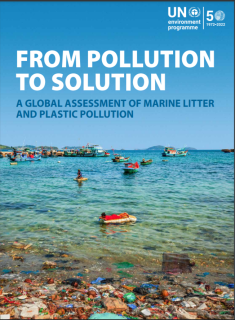
Decades of relentless use of plastics has led to a seemingly unstoppable flow of plastics into the environment, including out into the deep oceans. Largely a result of unsustainable production and consumption patterns and inadequate waste management, the challenge of plastics is now being compounded by the COVID-19 pandemic. Large amounts of plastic waste from personal protective equipment and additional packaging are being discarded directly into the environment.
This assessment provides the strongest scientific argument to date for the urgency of acting, and for collective action to protect and restore the oceans. The assessment details the impacts of marine litter and plastic pollution – from the population level to the sub-cellular – revealing previously unknown aspects of the effects of microplastics on physiology as well as their ecotoxicological effects on ecosystems, wildlife and humans.
Drawing on a comprehensive synthesis of the latest findings about the sources, pathways and fate of marine litter and plastic pollution, the assessment highlights the pervasiveness of plastics and microplastics, from the deepest abyssal environments to the most remote oceanic islands, and the extreme pressure being exerted on the planet.
